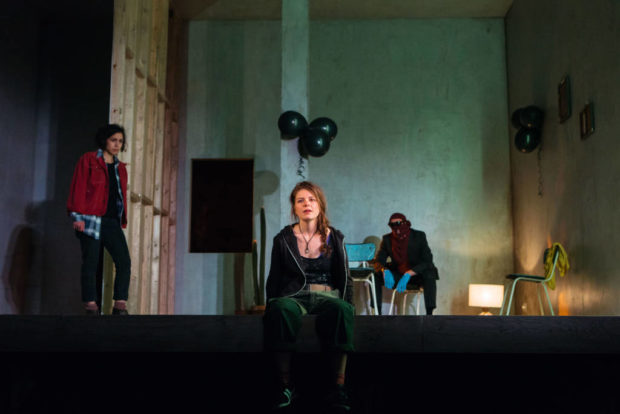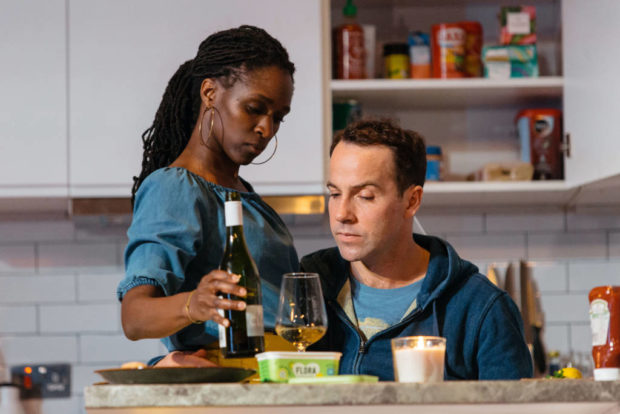You have no items in your cart. Want to get some nice things?
Go shopping
At a time when terrorism and political unrest are rarely out of the headlines, the Royal Court brings two meditations on radicalism and violence in nightly rep. And what different beasts they are! Though Chilean playwright Guillermo Calderón’s B has the pithier premise, Chris Thorpe’s Victory Condition is as much a bracingly fresh theatrical experience as a brutal and mind-bending analysis of extremism.
In Calderón’s play, young anarchists Marcela (Aimée-Ffion Edwards) and Alejandra (Danusia Samal) are planning to blow up a bank. Enter José Miguel (Paul Kaye), a self-styled enfant terrible from a who makes the young women question their revolutionary credo. In what feels very much like a post-Lemons Lemons Lemons Lemons Lemons gimmick, José Miguel won’t allow the “B word” to be spoken as the bomb is primed, preferring instead to refer to “the cow” or “the cheese”. Is this just an excuse for Calderón to write lines like “Cows kill. They’ve killed before” and “I was taught to make cheeses for war”? Perhaps, but José Miguel’s refusal to call a spade and spade is an apt symbol of the desensitization and distancing at the heart of the play.
In the UK at least, anarchists are almost impossible to take seriously. This is partly down to Joseph Conrad’s withering satire The Secret Agent, which took aim at anarchists’ empty slogans and directionless politics. Calderón doesn’t let them off lightly either. Marcela’s grand political vision is a future filled with “mostly reading and farming. Also singing”. Marcela and Alejandra act more from ennui than political fervour. “Where’s the red youth?” bewails José Miguel. “All you do is steal shoes and agree with each other.” There’s a blankness that hangs over the performances, sometimes making it difficult to care about the character’s actions. The young anarchists always appear more resigned than angry; their monologues fizzle, yet are never ignited by the fire of genuine political radicalism. That is, in part, what makes their meaningless act of violence all the more sad.
Calderón gives us plenty to think about, but B’s structure lets it down. The short performance lurches uneasily from black farce to something more serious, with the pace almost grinding to a halt when the characters take turns delivering long expository monologues. By the end of the piece, everyone is neatly placed into opposing political camps, articulating their beliefs and motivations more for the audience’s benefit then any natural demand of the play. Though all of the performances are credible, B never makes us truly empathise with its motley crew of would-be terrorists.

Thorpe’s Victory Condition, on the other hand, does not become entangled with the specifics of leftist generational infighting – its scope is so huge that it refuses to be contained within the constraints of naturalistic theatre. A couple are settling down to a cosy evening together – drinking wine, ordering takeout, aimlessly playing a video game. Amidst the beautifully choreographed domesticity they’re also delivering two very disturbing monologues. The Man (Jonjo O’Neill) is a sniper taking aim at a target he inexplicably falls in love with. The Woman (Sharon Duncan-Brewster) is caught up in a terrorist attack at her workplace which takes on metaphysical dimensions, shot through with the gothic surrealism of a Philip Ridley monologue. The connection between the two narratives, along with the connection between the speakers and the catalogue couple we see before us, remains tantalisingly unclear.
Victory Condition demands a lot from its audience – anything less than full concentration and you’re lost within the temporal leaps and bizarre digressions of its two intertwined narratives. Thorpe’s writing finds poetry in dense facts and he has a knack of finding striking metaphors; my favourite compares a bloodshot eye to “a river delta seen from space”. Vicky Featherstone’s always-stellar direction is just what Thorpe’s script needed. The pacing feels much tighter than in B; the rhythm of O’Neill and Duncan-Brewster’s deadpan delivery is a marvel in itself. A quick look at the playtext reveals Thorpe’s original ending has been unceremoniously cut, perhaps by Featherstone, and this undoubtedly improves the play. While Thorpe’s initial plan groped towards a near-unintelligible resolution in a brief scene of dialogue, the play we saw closes after a possible moment of apocalypse, simply with the actors looking each other in the eye for the first time.
So what do these plays teach us about extremism? A recurring theme is desensitization. The characters in Thorpe’s play eerily take turns playing fantasy video game Skyrim while describing brutal accounts of very real violence. Thorpe and Calderón both mix wincingly brutal language with blank delivery. In both plays the terrorists refuse to ascribe any value to human life; despite the sniper’s intense romantic fixation on his target in Victory Condition, he tells his victim “I am going to make you a hero” as he prepares to shoot. Does either play allow us to understand and empathise with the people behind unforgivable acts? A resounding no – but what more could we expect? As the media still struggles to find a motive for the Las Vegas killings (of which the sniper narrative in Victory Condition has unsettling echoes), it seems more and more like we can never really know what pushes people to do the unspeakable.
B and Victory Condition are in nightly rep at the Royal Court Theatre until Sat Oct 21.

About Simon Fearn
Simon is a student at Durham University and aspiring theatre critic. He has reviewed at the Edinburgh Fringe with EdFringeReview and is Stage Editor for Durham's student newspaper, Palatinate. He has also written music reviews for W!zard Radio and Cuckoo Review.




